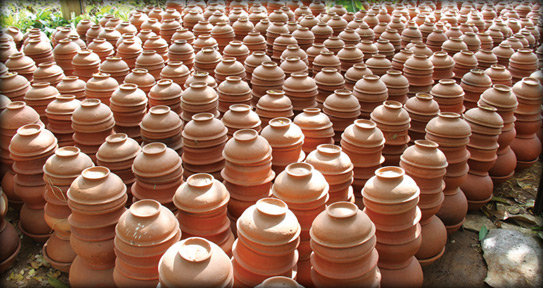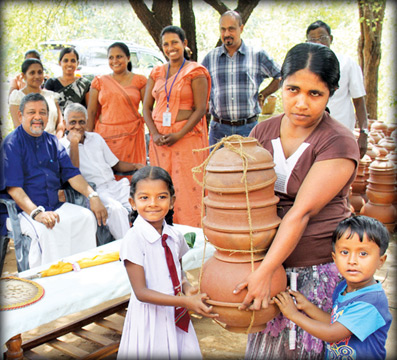|
In Rajarata:
Action plan to avert kidney disease
By Ranil Wijayapala
The recent surveys done on the spread of Chronic Kidney Disease (CKD)
in the North Central Province has revealed that around 17,000 people in
the North Central Province have become victims of this disease within
the past few years. It has therefore drawn the urgent attention of the
Government towards taking precautionary steps to avoid the spread of
this disease further.
|

Clay cooking utensils |
According to Dr. Asanga Ranasinghe, director of the Provincial Renal
Disease Prevention Unit of Anuradhapura General Hospital, around 17,000
people who have been affected with CKD were reported in the North
Central province by the end of last year and the province's monthly
death rate average as of the end of 2013 due to renal failure was 19.
According to him 3,194 patients of the CKD have been reported from
Medawachchiya, 2,653 from Padaviya, 1052 in Kebithigollewa, 800 in
Rambewa, 541 in Kahatagasdigiliya, 508 in Central Nuwaragam Palatha, 473
in Horowpathana, 351 in Nuwaragam Palatha East, 286 in Galenbindunuvewa,
274 in Thambuttegama, 253 in Thalawa, 248 in Nochchiyagama, 157 in
Kekirawa, 141 in Thirappane, 108 in Galnewa, 248 in Mihintale, 117 in
Rajanganaya, 90 in Ipalogama and 55 in Palagama in the Anuradhapura
district by the end of last year.
In addition, 4,493 patients have been reported from the Polonnaruwa
district with 1,114 from Medirigiriya, 966 from Hingurakgoda and 702
from Dimbulagala.
According to Dr. Ranasinghe, the annual increase in kidney patients
in Anuradhapura is approximately 1,450, and 450 in the Polonnaruwa
district.
According to Health Ministry statistics, the Ministry is spending
some US$3 million annually to treat persons diagnosed with CKD while
providing kidney patients receiving regular treatment with a monthly
stipend of about near $4 and those on dialysis, $11.
Several agencies and individuals who have carried out research on CKD
and have come up with varied presumptions. It is believed that the
disease has been attributed to the heavy metal cadmium, pesticides,
chemical fertiliser etc. connected with agriculture.
Some believe that this can be attributed to fluoride/ fluoride in
combination with aluminium, mainly from cooking utensils. Since of late,
arsenic, algal toxins have also been cited as possible reasons for CKD.
An extensive study was carried out by the World Health Organisation
and the Ministry of Health to determine the causes of CKD and their
latest report attributes the disease to substances such as cadmium which
could be present in chemical fertilizers, weedicides and pesticides. It
has also implicated high hardness in the drinking water.
Subsequent to the several studies and research carried out on CKD, it
has been widely accepted that supply of good quality drinking water is
one of the most important interventions for controlling the disease.
Therefore, President Mahinda Rajapaksa has instructed the relevant
authorities at least to get the young generation protected from CKD
spreading around the country by taking steps to provide them safe
drinking water facilities while they are engaged in studies.
President Mahinda Rajapaksa initiated this program of providing safe
drinking water for the school children after opening the new drinking
water project at Rambewa Maha Vidyalaya in Medawachchiya electorate
which records the highest number of CKD affected people in the North
Central province and from the entire country.
To cater to this project Ministry of Water Supply and Drainage
together with National Water Supply and Drainage Board and National
Community Water Trust developed a strategy and work plans which include
short term, medium term and long term plans to provide safe drinking
water to CKD affected areas.
According to Water Supply and Drainage Ministry officials this work
plans have been endorsed by the parliamentary subcommittee for CKD,
chaired by Hon. Vidura Wickramanayaka member of parliament, of Kalutara
district.
Since the majority of people living in those CKD affected areas, use
groundwater obtained from tube wells, hand pumps and dug wells which are
satisfactory for general purposes such as bathing, toilet, flushing,
washing of clothes and utensils, it may not be suitable for drinking and
cooking purposes.
"Only few areas have surface water based piped water supply. Thus it
has been decided to provide the CKD affected areas with good quality
water for their drinking and cooking purposes in which a per capita
supply of five litres per day is considered as adequate", officials from
the Ministry said.
The short term program of the Ministry covers the CKD affected areas
in the districts of Anuradhapura, Polonnaruwa, Badulla,Mannar, Ampara,
Trincomalee, Kurunegala and Matale.
Under these short term measures it has been identified to establish
small treatment Reverse Osmosis (RO) plants to purify groundwater from
wells or boreholes and supply the water to communities using water
bowsers.
"These small treatment units are operated by the respective
communities through Community Based Organisations (CBOs) and continuous
technical support of National Water Supply and Drainage Board (NWSDB) is
provided for operational and maintenance purposes", the officials said.
|

Providing clay cooking utensils |
Apart from that bowsers will be supplied to affected areas which are
in close proximity for bowser supply from existing water supply schemes
while extending the services provided from existing piped water supply
schemes to certain areas.
"Rain water harvesting is also promoted in areas where bowser supply
is uneconomical to cater to these needs", the officials said.
As a part of implementing this short term program in Anuradhapura
district the Water Supply Drainage Ministry has given priority for the
Padaviya, Medawachchiya, Kebithigollewa, Rambewa and Mahawillachchiya DS
Divisions to provide good quality water for cooking and drinking
purposes.
According to officials in Padaviya DS division, one RO plant has been
installed to cover Parakramapura and Track B. The RO plant for
Bogahawewa and Ruwanpura is being installed while preliminary work on
water supplies to the areas Sudharshanagama, Mahasenpura, Balayawewa,
Maithreepura, Abhayapura, Buddangala, Bisokotuwa and Padaviya 18th Post
are underway.
In Medawachchiya DS division, three RO plants have been installed in
Mahadivulwewa, Periyakulama and Karmbankulama while rainwater harvesting
is being also carried out in Thammanna Elawaka.
In Kebitigollawa DS division, rainwater harvesting is being carried
out in Thammennawa, D4 Wahalkada, Thiththagonewa, H and agala,
Kirimatiyawa and Halmillawetiya. Bowser supply is operated in
Eethalwiddawewa, Thimbiriwewa, Samadhigala, Ihalausgollewa,
Aiyanthigewewa and Kahatagollewa.
RO plants are to be installed under the proposed ADB project to cover
the areas of Halmillewa, Thiriyaya and Thimbiriwewa.
In Rambewa DS division, a RO plant has been commissioned in
Thambalagollewa-Wewalketiya while preliminary work on water supplies to
the areas Wahamalgollewa, Sangilikanadarawa are underway. Rainwater
harvesting is being provided to Ambagahawewa, Thalgahawewa, Kandewa,
Ikirigollewa, Diviyaudabandawewa.
The short term program is implemented using the capital funds of
Ministry of Water Supply and Drainage. The Ministry obtained Rs. 100 Mn
in 2013 and that amount has been fully utilised. An additional Rs. 20 Mn
has been transferred from savings of National Water Supply and Drainage
Board.
Private sector, NGOs have also contributed approx. Rs. 7 Mn. for the
program of safe quality drinking water for CKD affected areas.
The work program for 2014 has been developed based on the
availability of Rs. 1,100 Mn. In support of this strategy, the President
in his budget speech proposed to allocate Rs. 900 Mn for the year 2014
to install RO plants in the North Central province.
This program will include 126 RO systems, several rainwater
harvesting systems, additional bowser supplies and several service
extensions.
Eleven water bowsers obtained under the assistance of Japanese
International Cooperation Agency were also handed over to Anuradhapura
Water Supply Board last week under the patronage of President Mahinda
Rajapaksa during his visit to the district.
Coca-Cola Beverages Sri Lanka Ltd (CCBSL) also joined hands with the
Water Supply and Drainage Board to establish a Reverse Osmosis (RO)
water treatment facility to thousands of beneficiaries who reside in the
Padaviya division in Anuradhapura.
This unit can purify 30,000 litres of water per day and it will run
on 20 hours per day on seven days a week basis to provide safe drinking
water for the people in Padaviya.
As this program is carried out by the Ministry of Water Supply and
Drainage Child Development and Women Affairs Minister Tissa Karaliyadda
as a Minister representing Anuradhapura district has also launched a
program to educate the people about safe drinking water habits to
prevent spreading this disease further in the district.
Minister Karaliyadda also launched a program to provide set of clay
cooking utensils for the people living in the areas mostly affected from
the CKD in the Anuradhapura district as it has been suspected that the
use of low quality aluminium cooking utensils as one contributing factor
for the CKD. "The Government of President Mahinda Rajapaksa is committed
to provide all the medication for the CKD affected people while taking
steps to stop people becoming victims of this disease by providing them
required safe drinking water and other facilities", he said.
"President Mahinda Rajapaksa has also taken initiative to provide
safe drinking water for the schools in the areas mostly affected with
CKD as he wants to protect the young generation from this disease", he
said.
|

